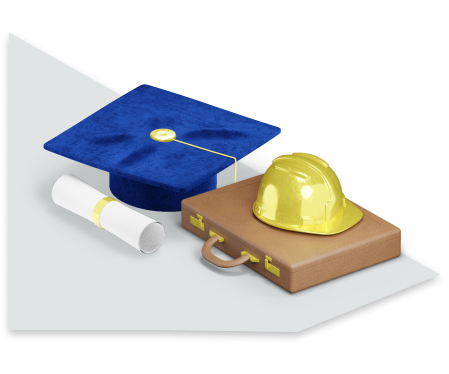Self-Employed Persons Program
Individuals who wish to settle in one of Canada's provinces or territories as a professional athlete or artisan can obtain a business immigrant visa for themselves and their immediate family. This program is designed to bring people to Canada who will work as self-employed individuals. Applicants must have either relevant experience in cultural activities or athletics.
The Start-up Visa Program
Under the federal Start-up Visa Program, immigrant entrepreneurs can develop their business in Canada. This program, recognized as one of the most unique immigration streams in the world, grants permanent residence to immigrant entrepreneurs while helping them settle in Canada.
Work Permit Options
For many entrepreneurs, the fastest way to enter Canada is to obtain a temporary work permit.
Under the CUSMA Investors stream, citizens of the United States who invest in new or existing businesses in Canada may be allowed to apply for an Investor Work Permit to manage their Canadian business. Entrepreneurs who intend to maintain the operation of an existing business abroad while expanding into Canada may be eligible for Intra-company Transfer Work Permits.
Those who are majority owners of a business in Canada can seek to obtain an Owner-Operator Work Permit. U.S. residents and citizens also have the option to enter Canada through the Global Talent Stream. Like the U.S., Canada is subdivided into different jurisdictions, called provinces and territories. These provinces are, in some ways, similar to the different states that make up the United States.
Can I move to Canada from the US to study?
There are now some 15,000 U.S. citizens who study in Canada each year. Over 1,500 universities, colleges and other educational institutions are authorized by Immigration, Refugee and Citizenship Canada (IRCC) to admit international students.
International students can work while studying in Canada, which helps supplement income and gain work experience. Graduates of eligible Canadian institutions can apply for an open work permit called a Post-Graduation Work Permit (PGWP). The PGWP allows recent graduates to get valuable Canadian work experience, which in turn can make them eligible for permanent residence and increase their odds of successfully obtaining immigration status.
How can I apply for Canadian Citizenship?
U.S citizens and residents who immigrate to Canada and reside in the country for a few years may eventually apply to become citizens of their adopted country. This is a process known as naturalization, and Canada has one of the most liberal and welcoming naturalization processes in the world. A person can be a citizen of both the U.S. and Canada.
Proof of Canadian citizenship certificates can be obtained by those born abroad to Canadian citizens, by Canadian citizens living abroad who wish to work in Canada in jobs reserved for those of Canadian nationality, or for children born abroad to Canadian citizens.
What is the immigration process to Canada from the U.S.?
The process will depend on the reason why you are moving and the length of your stay.
If you plan to settle permanently in Canada, the easiest way is to enter the Express Entry Pool. Express Entry is an online expedited immigration application system with a processing time of approximately six months. You will be assessed based on your skills, education and work history and you will receive a score that may earn you an invitation to apply for permanent resident status.
For stays longer than six months you will need to apply for a work or study permit. The length of your stay on this type of permit will depend on the length of your academic studies or the length of your job offer in Canada.
If you are planning to stay for just a few months, you may want to consider getting a visitor visa. A visitor's visa allows you to stay in the country for up to six months, with the possibility of renewing it 30 days before it expires.
Can I immigrate to Canada as a skilled worker?
Canada has over 100 merit-based immigration streams for skilled workers. These programs assess candidates based on their human capital, such as age, education, language skills, work experience, family ties in Canada, among other criteria.
U.S. residents and citizens may seek to immigrate as skilled workers through Express Entry. Those who already know which province or territory they plan to immigrate to, may be able to apply under one of the Provincial Nominee Programs. The Quebec Skilled Worker Program is also an option for those planning to settle in Quebec.
Canada assesses human capital criteria such as age, education, work experience, arranged employment, language skills and adaptability.
Federal skilled workers are selected under the Express Entry immigration system. Canadian provinces select internationally trained and experienced skilled workers based on the needs of employers in their province through their respective Provincial Nominee Programs.
Can I work in Canada without a work permit?
In general, you need a visa or work permit to be allowed to work in Canada. US citizens or residents coming to Canada on business may stay in the country without a work permit for up to 6 months. There are types of jobs that may not require a work permit, they include athletes or those coming to
Foreign individuals wishing to obtain a work permit must meet a number of eligibility requirements depending on their location at the time of application. The type of work permit that can be obtained depends on the situation of each person.
Can I bring my family members to Canada from the U.S.?
You can bring your spouse or common-law partner and dependent children with you when you decide to immigrate to Canada.
Your spouse may be able to join you in Canada on an open work permit, which allows him or her to work for any employer in Canada without having to make a confirmed job offer. Also, if you have accompanying dependent children, they do not need a study permit to study at Canadian educational institutions.
Canada recognizes the inherent rights of same-sex couples before the law, and this extends to immigration.
Can I go from temporary residence to permanent residence?
Yes, in fact, obtaining a temporary work permit in Canada is often seen as a step towards permanent residence in Canada. People who already have an active temporary work permit in Canada have several ways to move from temporary work permit to permanent residence, including applying under Express Entry Programs.
The Express Entry Comprehensive Ranking System (CRS) assigns points for human capital factors including work experience.
To be eligible for the Canadian Experience Class, you must have at least one year of skilled work experience in Canada and have gained your work experience by working in Canada while you were under temporary resident status.
If you are employed in Canada on a temporary work permit and the employer has made you an offer of employment for at least one year, you may also earn points under the Federal Skilled Worker Program.
Candidates may also choose to apply to one of the Provincial Nominee Programs. Provincial skilled worker programs usually require an employer to sponsor the candidate for admission to Canada. As a first step, candidates may receive temporary work permits to enter Canada while their permanent residence application is being processed.
Is immigrating to Quebec different than in the rest of Canada?
Quebec is a unique place in the Canadian landscape. As Canada's only predominantly French-speaking province. Under the 1991 Canada-Quebec Accord, the Quebec government is responsible for selecting economic immigrants to the province, including skilled workers and entrepreneurs. This selection process is managed by the Quebec Ministry of Immigration, Francization and Integration (MIFI).
Foreign nationals who wish to settle in Quebec may do so under economic immigration programs such as:
- Quebec Skilled Worker Program (QSWP)
- Quebec Experience Program (Programme de l’expérience québécoise (PEQ)
- Quebec Business Immigration







